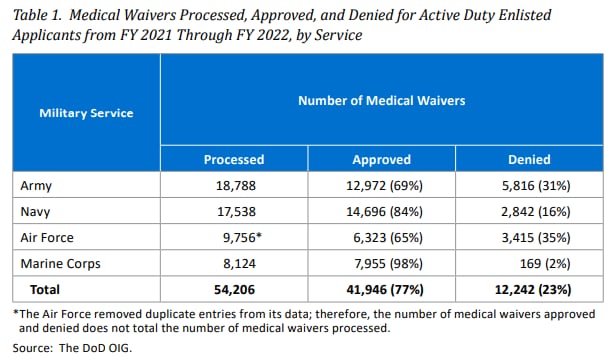As the military services continue to grapple with a recruiting crisis, a Pentagon watchdog report notes that each branch could do better when it comes to tracking medical waiver data.
The Defense Department Inspector General assessment, released Friday, found that the branches all review and approve medical waivers in the same way.
However, “the Services’ processes did not include tracking whether active-duty enlisted applicants who were permanently disqualified requested a waiver, or were encouraged to pursue one,” the report states. “Nor did the Services track the reason a waiver was not requested.
“By tracking the reasons for not processing a medical waiver, the Services could better understand barriers to entering military service, inform change to recruiting processes, and improve outcome for active-duty enlisted applicants,” the IG states.
Recent data suggests that recruits requiring waivers have become a significant part of the future force.
At least 1 in every 6 military recruits were given waivers to enter service in fiscal 2022, the highest percentage in at least 10 years, according to a Military Times investigation earlier this year.
RELATED

Leaders of the Army, Navy and Air Force told lawmakers last month that they expect their services to fall short of recruiting goals this fiscal year.
The Army is expected to be short about 10,000 active-duty soldiers, while the Navy will miss its active duty enlisted goal by 6,000 sailors, and the Air Force will fall short of its active duty enlisted recruiting goal by about 3,400 airmen.
The Marine Corps is expected to meet its recruiting goals for fiscal 2023.
The IG looked at all active duty enlisted applicants that were permanently disqualified from service in the Army, Navy, Air Force and Marine Corps due to a medical condition in fiscal 2021 and 2022.
All told, the services processed 54,206 medical waiver requests in that time frame and approved 77 percent of them from active duty enlisted applicants, according to the report.

Their survey did not include the Space Force, National Guard, reserve components or officer applicants.
When officials at 65 U.S. Military Entrance Processing Command locations nationwide medically disqualify an applicant, the applicant can request a waiver through the branch they are trying to join.
But the services “could not readily provide all of the requested data for active-duty enlisted applicants” that were disqualified by the processing command.
The services are not required to track if an applicant waiver was recommended or requested, the report noted, but added that the services should track and analyze the barriers applicants face when it comes to the medical waiver process “to maximize opportunities for enlistment across the Services.”
RELATED

The IG also found that recruiting commands faced “delays in medical waiver processing” due to the Military Health System Genesis, which was brought online in March 2022 at Military Entrance Processing Stations, where applicants are medically examined before they can sign up.
Genesis is a medical records system for service members, families and veterans that aims to make it easier for doctors to share medical information. It came about as part of a congressional mandate that the Defense and Veterans Affairs departments digitize health records. In the context of recruiting, the system allows processing stations to look at applicants’ civilian medical records, including hospital visits and prescriptions.
Some recruiters told Military Times earlier this year that Genesis makes it harder for applicants to omit portions of their medical history, a development some believed was contributing to the current recruiting crisis.
As a result, many more applicants are getting flagged, and the time to process applications and waivers is getting longer. Applicants don’t formally sign up until they’re cleared, and that longer process gives them more time to back out.
The IG report recommended that the services stand up tracking to better capture data on whether rejected applicants are offered a medical waiver request, while documenting the reasons such a waiver might not be requested.
The services all concurred with the recommendation but varied in plans to implement such reforms.
U.S. Army Recruiting Command aims to provide a “corrective action plan” by November and also requested a Defense Department-level review of the entire medical waiver process because the command’s own analysis of the complete medical waiver processing time found that it could take 70 days or longer for a waiver determination to be made.
RELATED

Navy Recruiting Command officials told the IG they would determine by later this year whether the existing applicant tracking system could start capturing such data.
The Air Force Recruiting Service will work to create a field in the recruiting information system that would document if a disqualified applicant chooses not to proceed with a waiver and the reason why they did not, a process that will take four to six months.
Marine Corps Recruiting Command leadership told the IG that “establishing a tracking mechanism for applicants cannot be implemented in the current recruiting information system,” but said such functions could be a part of future systems.
“The Marine Corps Recruiting Command will continue to encourage the DoD medical standard working groups to evaluate medical disqualification standards and remove barriers so that more applicants are medically eligible for military service,” the report states.
Geoff is the managing editor of Military Times, but he still loves writing stories. He covered Iraq and Afghanistan extensively and was a reporter at the Chicago Tribune. He welcomes any and all kinds of tips at geoffz@militarytimes.com.









